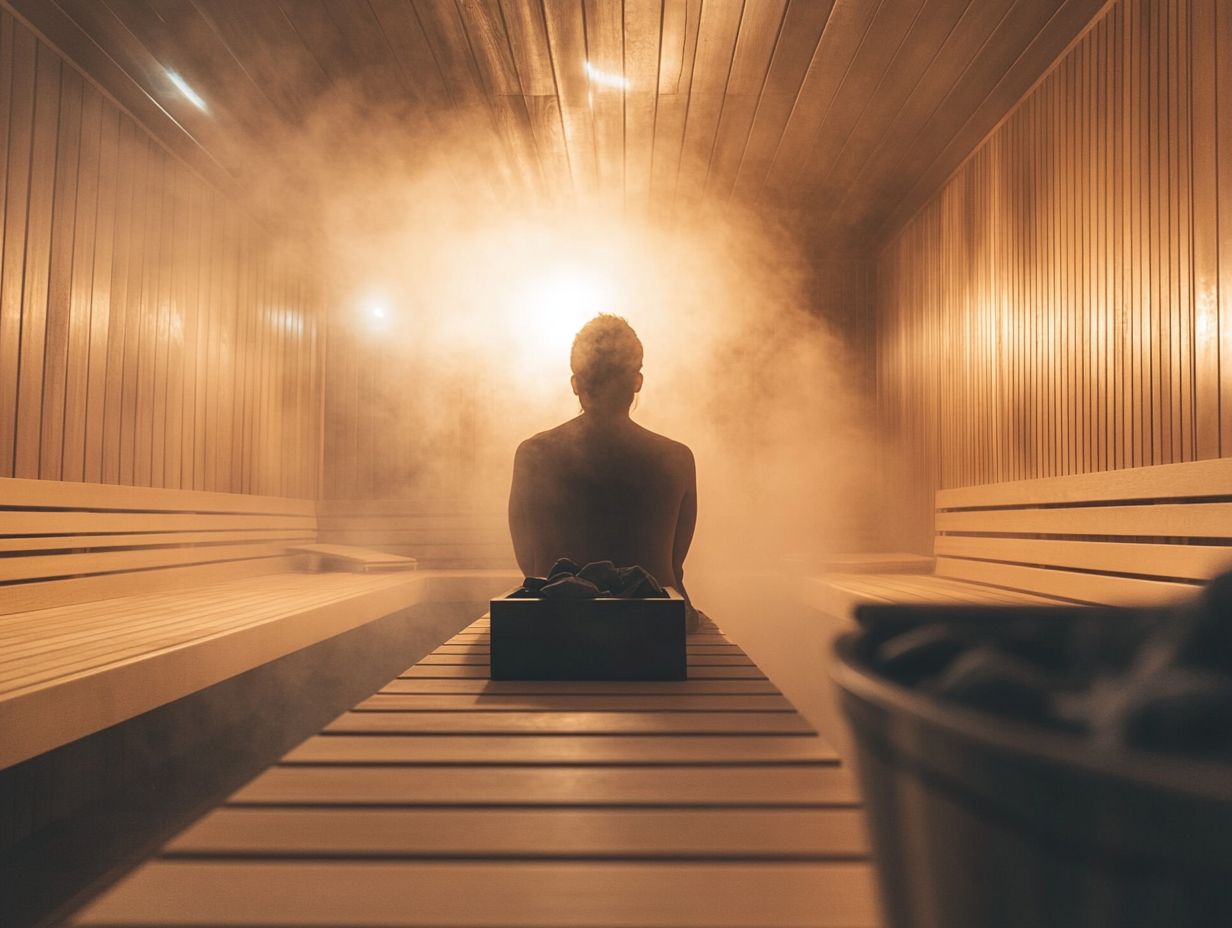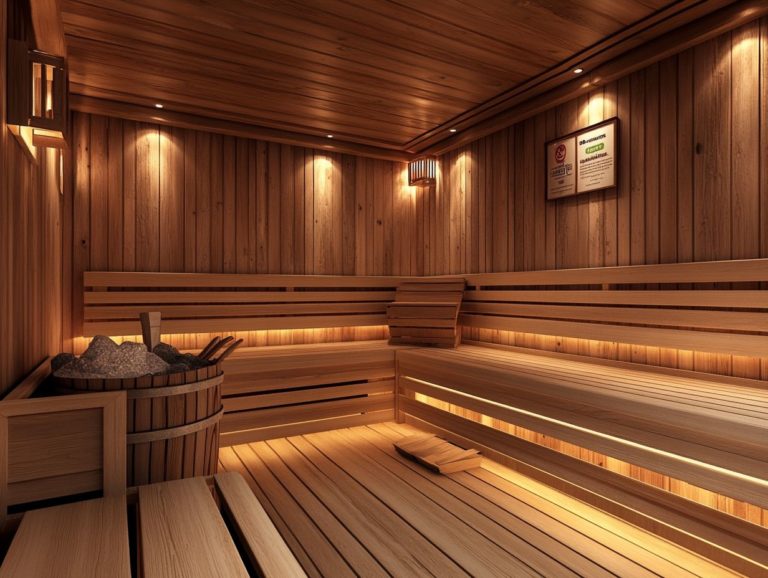Sauna Use and Mental Health: Safety Concerns
Sauna use has long been celebrated for its physical benefits, but emerging research suggests it may also have a positive impact on mental health.
This article delves into the psychological advantages of regular sauna sessions, all supported by solid scientific evidence. It s essential to understand the risks to enjoy the full benefits of your sauna experience!
You ll find safe practices outlined here to help you maximize the benefits while minimizing any harm. This article also explores alternative therapies for enhancing your mental wellness.
Dive in and discover how you can harness the power of the sauna to elevate your mental health journey.
Contents
- Key Takeaways:
- The Benefits of Sauna Use for Mental Health
- Potential Risks of Sauna Use
- Safe Practices for Sauna Use
- Alternative Therapies for Mental Health
- Frequently Asked Questions
- What are the potential safety concerns associated with sauna use for individuals with mental health issues?
- Are there any mental health conditions that may be worsened by sauna use?
- Can sauna use affect medication effectiveness for mental health conditions?
- What precautions should individuals with mental health issues take before using a sauna?
- Are there any mental health benefits of sauna use?
- What are some alternative options for individuals with mental health issues who are unable to use a sauna?
Key Takeaways:

- Sauna use can significantly reduce anxiety and boost your mood.
- Be aware of safety concerns, especially if you have existing mental health conditions.
- Stay hydrated and follow recommended sauna durations to maximize benefits safely.
The Benefits of Sauna Use for Mental Health
Using a sauna has gained remarkable recognition for its significant benefits on mental health. It can alleviate chronic stress and anxiety, elevate your mood, and lower cortisol levels essential factors for your overall well-being.
Both traditional and infrared saunas offer therapeutic advantages that enhance cardiovascular health and promote relaxation techniques, fostering a positive mental state.
In Finland, where sauna bathing is woven into the fabric of daily life, extensive research highlights the strong link between sauna use and improved mental health outcomes. This practice has become an integral part of wellness for many, illustrating just how beneficial a simple sauna session can be for enhancing your mental vitality.
Research and Evidence
Research on sauna use reveals remarkable mental health benefits, with numerous studies linking regular sauna bathing to improved mood and a decrease in depressive symptoms. This is particularly evident through mechanisms involving heat shock proteins, which are proteins that help your body respond to heat stress, and neurogenesis, the process of forming new brain cells.
A comprehensive review published in the Journal of Clinical Psychiatry found that participants engaging in sauna sessions at least four times a week experienced an impressive 40% reduction in depressive symptoms. This underscores the profound impact of heat exposure on emotional well-being.
Dr. Anna Lindholm, a leading researcher in the field, emphasizes that the physiological responses to heat can lead to a release of endorphins and a reduction in cortisol levels, both crucial for managing chronic stress.
By fostering resilience against everyday stressors, sauna use emerges as a practical and accessible therapy for those tackling symptoms of anxiety and depression.
Potential Risks of Sauna Use
While you can reap a wealth of mental health benefits from sauna use, it’s vital to recognize the potential risks involved, especially if you have pre-existing conditions like chronic pain, asthma, or cardiovascular disease.
Have you experienced the benefits of sauna use? Share your thoughts below!
Physical Risks

Physical risks associated with sauna use can include dehydration, overheating, and sudden drops in blood pressure. These issues may pose challenges for individuals with cardiovascular health issues.
Dehydration is especially concerning as it can lead to dizziness, fatigue, and decreased electrolyte levels. This ultimately strains your body’s normal functions. If you have existing cardiovascular conditions, it s vital to take extra caution. The heat can worsen these issues, leading to dangerous complications.
Stay hydrated before, during, and after your sauna sessions. Incorporate electrolyte-rich fluids when necessary. Limit your sauna exposure to around 15-20 minutes and take frequent breaks to enhance your safety.
If you have heart-related concerns, consult a healthcare professional before using the sauna. This way, you can enjoy the potential benefits without compromising your overall health!
Mental Health Concerns
Using a sauna can offer anxiety relief and support for mood disorders. However, it s important to be aware that certain mental health concerns may arise, particularly if you have underlying anxiety or claustrophobic tendencies.
The intense heat and confined space can sometimes amplify feelings of panic or discomfort, especially if you re navigating anxiety disorders. Be mindful of your mental and emotional responses during your sauna sessions!
To create a more positive experience, consider the following strategies:
- Gradually acclimate to the heat, allowing your body to adjust.
- Visit during less crowded times to give yourself more space to breathe.
- Use relaxation techniques, such as deep breathing, before and during your sauna session.
Don t hesitate to communicate your needs to a trusted companion or sauna staff. Doing so can significantly enhance your experience, cultivating a comforting and rejuvenating atmosphere.
Safe Practices for Sauna Use
To truly enjoy the benefits of sauna bathing while minimizing potential risks, follow recommended safe practices. Stay adequately hydrated, adhere to duration limits, and be aware of your individual health conditions.
Guidelines for Safe Usage
Guidelines for safe sauna usage emphasize the importance of proper hydration, health monitoring, and recognizing your personal tolerance levels. This will help you enjoy sauna bathing without adverse effects!
To create a comfortable and beneficial experience, drink water before and after each session. The heat can lead to significant fluid loss. It s advisable to limit your time in the sauna to no more than 15-20 minutes, especially if you re new to this practice, to avoid overheating.
Pay attention to your body temperature. If you start to feel dizzy or excessively hot, exit the sauna promptly. By following these precautions, you can enhance your relaxation experience while minimizing any potential risks!
Alternative Therapies for Mental Health

In addition to using a sauna, exploring alternative therapies for mental health can provide valuable avenues for relaxation techniques, anxiety relief, and effective treatment for depression.
Exploring Other Options
Exploring alternative options for mental health, such as yoga and meditation, opens up effective pathways for enhancing your overall well-being. These practices beautifully complement the benefits of sauna use.
Not only do they promote relaxation, but they also nurture mindfulness, allowing you to cultivate a deeper connection with yourself. Engaging in yoga enhances your flexibility and reduces stress. Meanwhile, meditation fosters a serene mental state that harmonizes perfectly with the calming effects of sauna bathing.
Integrating these therapies into your daily routine can be simple. Dedicate 10 to 15 minutes each morning to a meditative practice or attend a weekly yoga class. Pairing a sauna session with gentle stretching routines afterward creates enhanced benefits for both your physical and mental health.
Frequently Asked Questions
What are the potential safety concerns associated with sauna use for individuals with mental health issues?
Some safety concerns include dehydration, overheating, and an increased risk of blood pressure changes or cardiac events.
Are there any mental health conditions that may be worsened by sauna use?

Individuals with bipolar disorder, schizophrenia, or other psychotic disorders may experience a worsening of symptoms due to the extreme heat and stimulation of sauna use.
Can sauna use affect medication effectiveness for mental health conditions?
Yes, sauna use may affect the absorption and effectiveness of certain medications for mental health conditions. Always consult with your doctor before using a sauna if you are taking any medications.
What precautions should individuals with mental health issues take before using a sauna?
It is important for individuals with mental health issues to consult with their doctor before using a sauna. Avoid using it alone. Start with shorter sessions and gradually increase time and temperature to prevent potential adverse effects.
Are there any mental health benefits of sauna use?
While sauna use may not be suitable for everyone with mental health issues, some studies have shown potential benefits. These include reduced symptoms of depression, anxiety relief, improved sleep, and increased relaxation. Sauna bathing can promote heat therapy, which may help manage chronic stress and improve mood.
What are some alternative options for individuals with mental health issues who are unable to use a sauna?
Alternative options for relaxation and self-care include mindfulness exercises, yoga, meditation, or gentle exercise. Techniques such as infrared sauna use or other wellness practices may also be helpful. It’s essential to talk to a healthcare professional, like Dr. Jeffrey Lieberman, to find the best option tailored to your specific needs, especially for mood disorders, chronic pain, or conditions like asthma and Alzheimer s disease.
Always check with your doctor before trying sauna therapy, especially if you’re taking medication for mental health. Discover how simple practices like yoga and meditation can transform your daily routine and boost your well-being!






